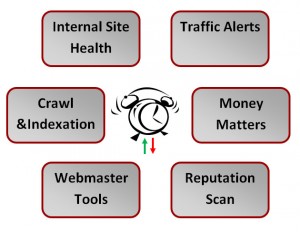How To Avoid SEO Pitfalls With Timely Alerts
In the world of SEO, there are big updates like Panda, Mayday, Vincent, Florida, but there are also smaller internal issues that can creep up on you leading to traffic and revenue loss. The ability to identify and prevent self inflicted nicks and cuts along the way is key to a successful SEO program for […]
In the world of SEO, there are big updates like Panda, Mayday, Vincent, Florida, but there are also smaller internal issues that can creep up on you leading to traffic and revenue loss. The ability to identify and prevent self inflicted nicks and cuts along the way is key to a successful SEO program for online retailers.
 When dealing with large, product-driven sites, automation and templates, things are bound to fray and break over time.
When dealing with large, product-driven sites, automation and templates, things are bound to fray and break over time.
Getting alerted and identifying the issue is half the battle. Dashboards are a great way of staying on top of internal issues, as well as competitor and industry movements, for the metrics that matter most to you.
Start by creating your own mini-dashboard with the basics your team and organization start seeing the benefits, you will be building more complex and exciting modules in no time.
Think about an action plan for as many scenarios as you can. You will need to customize it but having an outline with defined responsibilities empowers your team to take action in a more organized way.
Here are a few ideas to get you started.
Internal Site Alerts
These alerts should notify you of any changes to SEO functionality on your site.
- Updates to the robots.txt
- Updates to the URL structure?
- New links, especially external links added to the homepage and other high PR sections on the site?
- Spike in the number of 404 (not found) pages on the site
- Spike in the number of redirected (302 or 301) pages on the site
- Large fluctuations in product coverage
- Significant increase in the number of missing meta titles and descriptions for the site
- Significant increase in the page load time
- Spike in the number of external links to any page on the site
- Removal or addition of large sections of content across the site
- Increase in the number of orphaned web pages
Traffic Module
- Has there been a significant change in the traffic week over week as well as year over year? Make sure to set reasonable thresholds for alerts.
- Has there been a change in the mix of traffic (by source, category or type of page) and by how much?
- Are competitors getting a lot more traffic from a different/new traffic source?
- Are there spikes/drops in traffic, conversions or revenue for specific categories of certain days of the week or certain times during the year?
- Are certain page types on your site performing (traffic, conversion, revenue, backlinks) significantly better or worse than others?
- Is there a significant change in the number of impressions your site receives from different traffic sources?
Crawl & Index Module
- Are there big fluctuations in the crawl frequency for key pages on the site? Does your blog get more spider visits than the shopping guide? Do search engine bots hang out more on your product pages or category pages?
- Is there a spike or drop in the number of pages indexed across different categories, sub-domains or types of pages?
Money Module
- Revenue by product category
- Revenue by traffic source
- Seasonal impacts
- External and internal events influencing traffic and revenue
Reputation Module
- Site name mentions
- Key executive name mentions
- Rank/position on search engines for a handful of evergreen key terms
Webmaster Tools Module
- Not found pages
- Redirects
- Duplicate content
Due to all the moving pieces that SEO has to contend with, the ability to get real time alerts and quickly deploy a game plan is critical. Keep up the momentum of your SEO efforts by averting potential issues with a simple set of alerts.
You will find yourself tweaking and modifying these alerts from time to time and even delegating some of these to your team to validate. For anyone managing an SEO program, an alert dashboard, even in its most basic form is a must have.
Contributing authors are invited to create content for Search Engine Land and are chosen for their expertise and contribution to the search community. Our contributors work under the oversight of the editorial staff and contributions are checked for quality and relevance to our readers. The opinions they express are their own.
Related stories
New on Search Engine Land